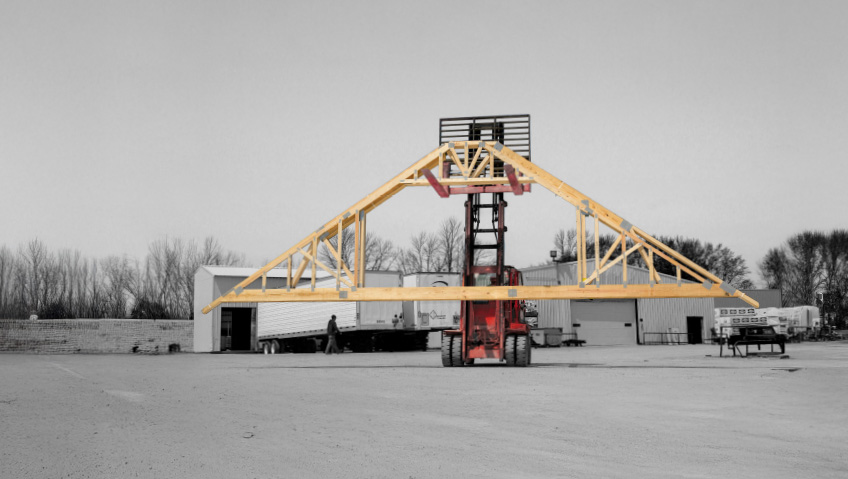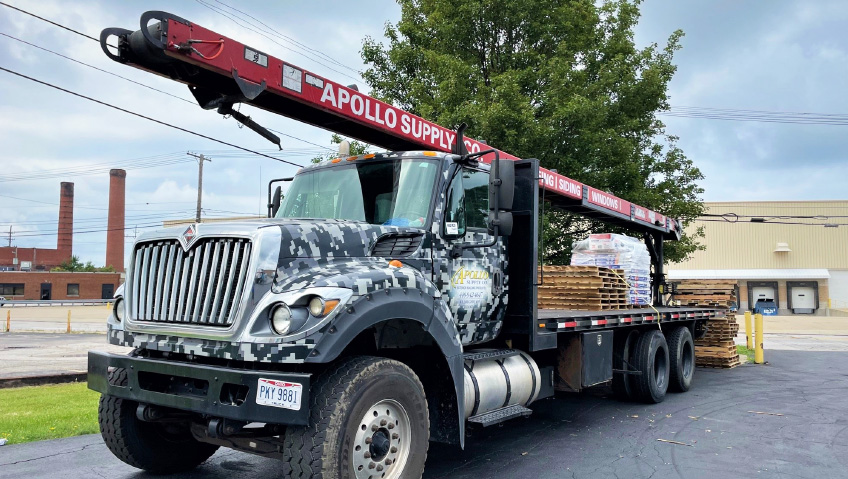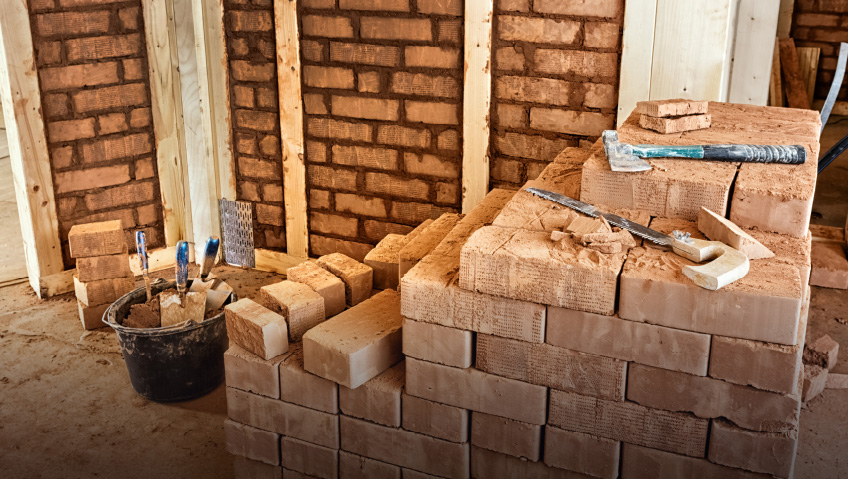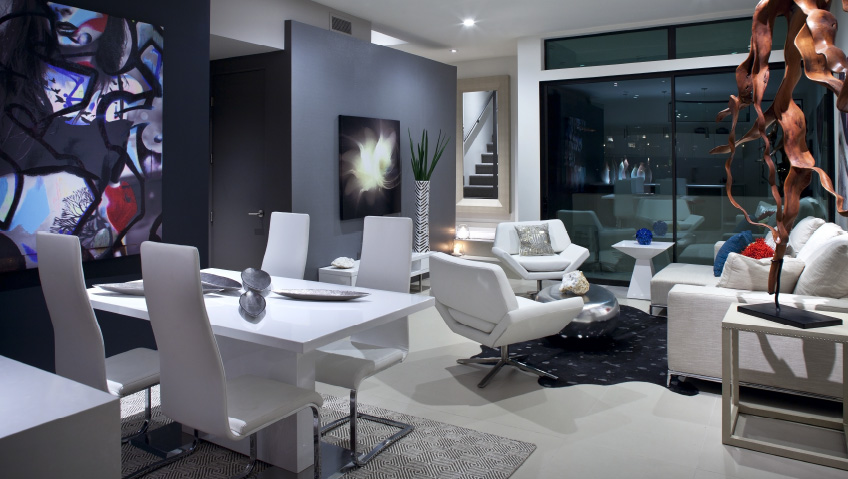Richco Structures of Haven, Wisconsin is a family business that designs, builds, and delivers roof and floor trusses, walls, and other building components. Richco is part of a larger corporate entity called Richardson Industries, which boasts an even longer history than the state in which it is based.
“We were around before Wisconsin became a state. Since there was no official State of Wisconsin, we could not file our business license until 1848, which we now denote as our official incorporation,” notes Richardson Industries President Justin Richardson.
Equally remarkable, Richardson Industries has been a family enterprise since its inception, and Justin represents the seventh generation of his family to lead the firm. The company marked its 175th anniversary in 2023 with a celebration, and is presently gearing up for expansion, he says.
Roof trusses currently comprise the largest share of Richco’s business. Roof trusses offer a sturdy, well-engineered alternative to traditional building framing and reduce construction costs as they eliminate the need for interior bearing walls. Using a roof truss will “speed up the building process and allow for the trades to get in quicker,” explains Richardson.
A floor truss, which is also made out of wood and metal connector plates, is used to develop a floor framework. These also help speed up the building process along with offering customers clear spans that open up basement spaces.
Both kinds of trusses, along with the rest of the company’s products, are manufactured in-house at its plant in Haven; all engineering, production, and design are performed by Richco employees.
As a business-to-business operation, about 90 percent of everything Richco makes is supplied to lumber yards, making it a distributor as well as a manufacturer. Roughly 65 percent of the company’s products end up being used in the residential sector, while another 35 percent go to multi-family and commercial projects. The company primarily serves the Wisconsin market, although it has also done business in Illinois, Northern Indiana, and Upper Michigan.
Quality is key
Richco maintains a mindful ethos. “I always tell everyone, lumber needs to be green and renewable, because it needs to stay competitive in price,” Richardson states, adding that, “sustainable forestry techniques are the most profitable way to do it. No one is clear-cutting anymore; it’s not a very good system.”
The company purchases much of its lumber from a membership-based buying group called LMC of Wayne, Pennsylvania, and “we still maintain some direct relationships with mills. The vast majority of the lumber we purchase is from Canada. It’s SPF grade, and we bring it in by railcars,” he explains. SPF refers to spruce, pine, and fir—three evergreen trees found in coniferous forests that are commonly used in construction.
In addition to buying high-quality lumber, the company runs a comprehensive internal quality assurance program and is subject to third-party inspections by the Truss Plate Institute, a Maryland-based organization that maintains quality standards among companies in the wood and metal plate truss market. Richco also has truss designer accreditation through the Structural Building Components Association (SBCA) and boasts a reputation for top-notch work.
“Our industry is making a big push to get all the jobs in the truss industry certified, so that if [a worker] moves and finds another truss company in a different part of the country, they can take that certification with them,” Richardson points out.
Indeed, Richco’s technical staff members stay abreast of any changes to regulations and codes, and the company’s manufacturing plant is equipped with the latest truss equipment, component saws, and automated jigging tables. Richco promises fast delivery of its products, courteous drivers, and all-around excellent customer service.
A solid team
The company aims to treat its staff as well as it treats its clients. Safety, for example, is an “every day, all-day” concern, “not something that we ever take for granted.” Proper PPE, regular maintenance of existing equipment, thorough training on new equipment, and staying on the lookout for potential hazards and dangers are all par for the course.
Richardson Industries also includes Richardson Contract Furniture, which is based in Sheboygan Falls, Wisconsin. This company serves as an original equipment manufacturer “for some high-end commercial furniture outlets,” says Richardson. Altogether, Richardson Contract Furniture and Richco Structures employ roughly 200 people, and Richco seeks certain traits from prospective new staff.
“We like to hire adults; we want people who are self-motivated and don’t require a lot of management. We want to tell you what the job is, tell you the parameters on how to do it, but give people the ability and freedom to do it how they see fit and how they feel is the best way to get it done,” he says. Indeed, the culture can be best summarized as “get the job done,” he shares.
A storied history
Looking back over the company’s long history, Justin Richardson says he’s proud of the company’s ability to bounce back, adjust, and innovate. Richardson Industries originated as a lumber mill before evolving into a furniture manufacturer. In its early days as a manufacturer, it produced ‘brawl-proof tavern chairs’—a product line that offers an intriguing insight into historical American drinking habits—among its wares. “We made cheese boxes. We made a lot of things that just don’t exist anymore,” he laughs.
At one point in the 1980s, Richardson Industries ran a “multi-million-dollar domestic furniture facility,” with a nationwide market and hundreds of employees, he recalls. Faced with brutal, low-cost competition from China, the company pivoted. Richardson Industries still makes furniture, while the Richco segment of the business supplies wooden building material.
“It hasn’t all been smooth sailing for 175 years, but it’s definitely been interesting,” Richardson tells us.
Given such a rich legacy, it is no surprise that one of his key goals is to keep “continually moving and innovating.” Richco was recently recognized for its innovation, earning an award from the Sheboygan Chamber of Commerce for a workplace literacy program. The company launched the program to address a language barrier, as many of the company’s employees are Hispanic; some, in fact, are asylum seekers from Nicaragua. The team hired an outside firm to lead lunchtime English classes and to teach “some of the managers enough Spanish to be dangerous,” Richardson says.
These days, Richco Structures does not do a huge amount of promotion, a reflection of its clientele and a reputation that speaks for itself. “We have such a small customer pool. We really rely on our product, our design, and our customer service to speak for itself. [We want] framers in the field to prefer using Richco Structures over other truss companies and developers and builders to know when they buy our products through one of our trade partners, they can be confident it’s going to be on-time, in full, and correct.”
The company’s long history also includes a tradition of giving back to the community. The Sharon S. Richardson Community Hospice, based in Sheboygan Falls, Wisconsin, exemplifies this trait. Sharon Richardson—Justin’s grandmother—died in 2004 of breast cancer. One of her last wishes was for the family to establish a community hospice. In 2007, the facility opened its doors, offering hospice and palliative care among other end-of-life services for anyone in the area “regardless of income or insurance. We’re really proud of what it has done for the community and the service it provides.”
Looking to the future
For all its recent success, Richco is grappling with certain industry challenges, including inflation. “The price of building continually goes up and up every single year,” says Richardson. “All we can do is become more efficient in how we make our products, how we engineer our products, and make sure that our customers have the best price.”
His industry peers need to understand that “we don’t need to lower the quality of what we’re doing in order to lower costs. I think it’s important that industry maintains [itself as] a strong provider of quality materials,” he adds.
That said, he is strongly optimistic about the future. There are no plans to sell or change the family-ownership structure. At present, two of his cousins work for the firm, as a truss designer and floor truss assembler, while other family members are company co-owners.
“We want to continue to provide a quality product. I’d also like to be selling more than I am today,” says Richardson, simply, of the company’s plans for the years to come.






